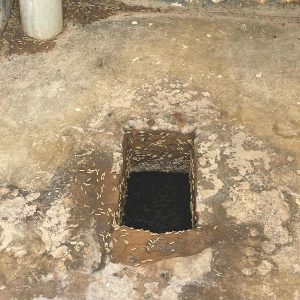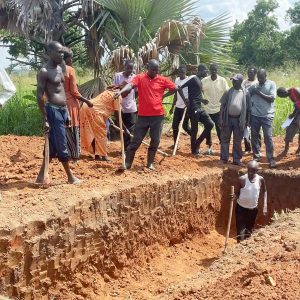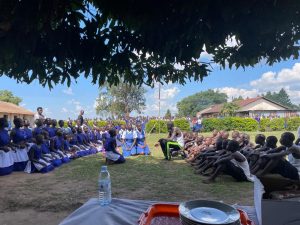ADVOCACYNET 384 July 29, 2022
Community-Built Toilets Promise Better Hygiene for 1,400 Students in Uganda

Beneficiaries of WASH: Girls at the Awach Primary School have new toilets and rooms where they can change and wash
Fifteen new toilets have brought relief to a community school in northern Uganda after years of poor sanitation and a demoralizing lockdown caused by the COVID-19 pandemic.
The toilets were installed and renovated at the Awach Primary School this summer by the Gulu Disabled Persons Union (GDPU) with funding from The Advocacy Project (AP). They were inaugurated last week at a joyful ceremony attended by over a thousand teachers, parents, village leaders and local government officials.
 The toilets are part of an integrated package of Water, Sanitation and Hygiene (WASH) designed by GDPU and AP for primary schools in Uganda.
The toilets are part of an integrated package of Water, Sanitation and Hygiene (WASH) designed by GDPU and AP for primary schools in Uganda.
With more than 1,400 students, Awach is the fifth – and largest – school to receive the package. AP has sent nine student volunteers (Peace Fellows) to assist and raised $42,600 for the program since 2012, as described here.
Last week’s ceremony began with a traditional dance (Bwola) by students, followed by a hearty meal of barbecued cow. Visitors were then welcomed by the parish priest and Joyce Otim Okee, the head teacher at Awach whose enthusiasm swung the community behind the toilet project. Ms Otim was followed by a mother who spoke on behalf of parents and said simply: “We are blessed.”
The ceremony was also attended by Cesar Akena, the District Education Officer, Vicky Atim, who is responsible for education on the Gulu City Council, councilors for persons with disability and GDPU Board members.
The ceremony left the GDPU team exhilarated and keen to take on new WASH projects. “The toilets are looking very beautiful,” said Emma Okello, the GDPU project manager, who is seen addressing the ceremony in the photo above. “Awach primary school and the community appreciated us so much. We really saved them from heartbreak.”
Ms Okello read a statement of congratulations from AP. The ceremony also heard from Kyle Aloof, this year’s Peace Fellow at GDPU, who thanked teachers and students for their kindness towards him and paid tribute to Geoffrey Okema the contractor and his team.
 The Awach toilets were in a foul state before the GDPU team got to work (photo). As Mr Aloof put it in a blog: “Students are consistently faced with a horrific stench when they enter…. They notice feces smeared across the walls and maggots seeping out of the toilets.”
The Awach toilets were in a foul state before the GDPU team got to work (photo). As Mr Aloof put it in a blog: “Students are consistently faced with a horrific stench when they enter…. They notice feces smeared across the walls and maggots seeping out of the toilets.”
It was particularly difficult for girls, who had to wait in line and often found the toilets blocked by discarded tampons.
GDPU’s model relies on help from the community and over 120 parents turned up to dig a new latrine at Awach (photo below). The contractor then built five new toilet stalls above the latrine and renovated ten existing stalls, some of which were collapsing. Water tanks were also installed for handwashing.
The project addressed the special needs of girls by building a changing room to ensure privacy and a second room – made from left-over building materials – where girl students can wash and bathe. The school will purchase buckets to allow for the collection and disposal of used tampons.
GDPU also addressed the needs of about 80 students with a disability by building a new toilet with a ramp and guardrails, and organizing a day of inclusivity training for Awach teachers and parents. GDPU plans to follow up with trainings on hygiene.
 GDPU and AP will supply the school with toilet paper and all-purpose liquid soap through to the end of 2022. The soap carries the brand name of Clean Wash and was developed in early 2020 with funding from AP in response to the pandemic. Four GDPU members with a disability have produced 500 liters for Awach under the leadership of Ms Okello.
GDPU and AP will supply the school with toilet paper and all-purpose liquid soap through to the end of 2022. The soap carries the brand name of Clean Wash and was developed in early 2020 with funding from AP in response to the pandemic. Four GDPU members with a disability have produced 500 liters for Awach under the leadership of Ms Okello.
Following its success at Awach, GDPU will now make regular visits to all five schools where it has worked to check up on the toilets, water, enrollment and hygiene. Looking further ahead, GDPU hopes to scale up the program and feels it can manage two school projects a year.
Given that over half of the primary schools in Gulu district need new toilets, the need is great. GDPU also notes that its toilets are less expensive than those installed by the government or aid agencies. The Awach package cost $15,077 thanks to the labor donated by the community and GDPU’s insistence on competitive bidding.
Starting in the Fall AP will seek new donors to help GDPU scale up its WASH program. The Awach project has been generously funded by the Prince of Peace Lutheran Church in Dublin Ohio and by the Rotary Club of North Kingstown, Rhode Island.
Delaney Rogers from AP met with the Rotary Club of Gulu during a recent visit and was told that the club would welcome a partnership with US-based Rotary clubs to support GDPU’s WASH program in schools. AP will now explore possibilities in the US.
Photos by Kyle Aloof and Delaney Rogers
* Read the blogs of Peace Fellows who have worked at GDPU since 2012
* Watch this video about the WASH crisis in the primary schools of Gulu
* Read more about GDPU’s community WASH model
* Interested in helping? Email us
*


